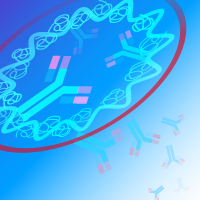Antibody therapeutics

The use of monoclonal antibodies (mAbs) for cancer therapy has achieved considerable success in recent years due to their high specificity, activity, and favorable pharmacokinetics, as well as the availability of strategies to successfully engineer antibodies into humanized forms. Antibodies are capable of recruiting the immune system to attack cancer cells through complement-dependent cytotoxicity or antibody-dependent cellular cytotoxicity (Liu and Mardis 2017). Mechanisms of direct tumor cell killing by antibody-mediated apoptosis include neutralization of cell-surface-bound enzymes and induction of receptor agonist or antagonist activity.
In another approach, antibodies deliver drugs targeting cancer cells via antibody-drug conjugates (ADCs). ADCs direct cytotoxic compounds to tumor cells after selective binding to cancer cell surface antigens, internalization, and intracellular drug release (Wold et al. 2016). Moreover, ADCs are powerful new treatment options for lymphomas and solid tumors, and immunomodulatory antibodies have recently achieved remarkable clinical success. New advances in protein engineering technology have also generated multiple bispecific antibody (BsAb) formats capable of targeting numerous antigens as a single agent and directly targeting immune cells to tumors, thus reducing drug resistance and severe adverse side effects (Thakur et al. 2018).
Highlighted product
In-Fusion Cloning technology enhances antibody discovery and engineering workflows by speeding up the generation of antibody expression constructs. In-Fusion Cloning is fast (15 min), highly efficient (>95% cloning efficiency), sequence independent (any PCR insert can be cloned into any vector at any locus), seamless (no extra bp or amino acids added to target antibody), directional, and high-throughput (HTP) ready. Several publications have utilized the In-Fusion Cloning technology for HTP antibody fragment cloning due to its high cloning efficiency and accuracy (Spidel et al. 2016; Chen et al. 2014; Meng et al. 2015).
References for antibody therapeutics and selected publications citing the use of In-Fusion Cloning for HTP antibody cloning
Chen, C. G. et al. One-step zero-background IgG reformatting of phage-displayed antibody fragments enabling rapid and high-throughput lead identification. Nuc. Acids Res. 42, e26 (2014).
Meng, W. et al. Efficient generation of monoclonal antibodies from single rhesus macaque antibody-secreting cells. mAbs 7, 707–718 (2015).
Spidel, J. L. et al. Rapid high-throughput cloning and stable expression of antibodies in HEK293 cells. J. Immunol. Methods 439, 50–58 (2016).
Thakur, A. et al. Bispecific antibody-based therapeutics: strengths and challenges. Blood Revs. 2, 004 (2018).
Wold, E. D. et al. Antibody therapeutics in oncology. Immunother. Open 2, 108 (2016).
Featured products
Takara Bio USA, Inc.
United States/Canada: +1.800.662.2566 • Asia Pacific: +1.650.919.7300 • Europe: +33.(0)1.3904.6880 • Japan: +81.(0)77.565.6999
FOR RESEARCH USE ONLY. NOT FOR USE IN DIAGNOSTIC PROCEDURES. © 2025 Takara Bio Inc. All Rights Reserved. All trademarks are the property of Takara Bio Inc. or its affiliate(s) in the U.S. and/or other countries or their respective owners. Certain trademarks may not be registered in all jurisdictions. Additional product, intellectual property, and restricted use information is available at takarabio.com.




